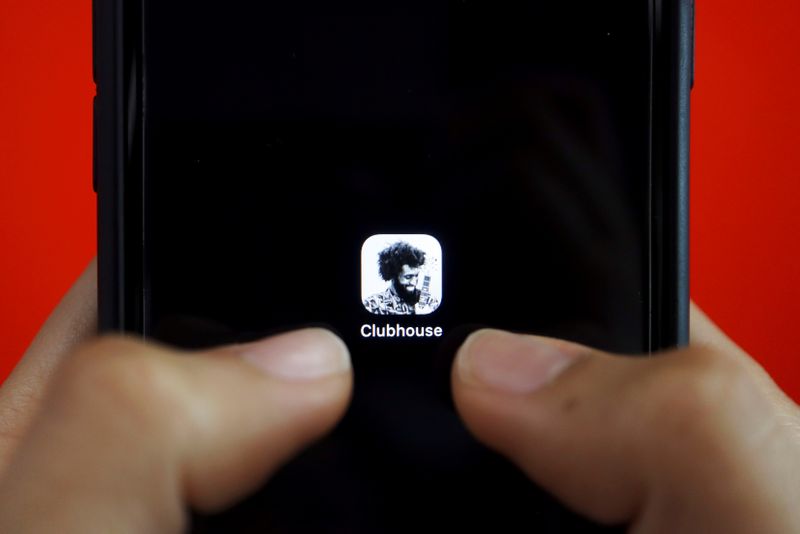By Sheila Dang
(Reuters) - Last month, during a live game show on audio-chat app Clubhouse, tech entrepreneur and investor Noah Lichtenstein and his co-hosts handed out $3,200 in prizes funded by Square Inc-owned payment company Cash App, which sponsored the event.
Days later, top executives from Restaurant Brands International (NYSE:QSR), owner of fast food chains Burger King and Popeyes, created their own Clubhouse room to let people quiz them on anything they wanted after their quarterly financial report in an event billed as “Open Kitchen”.
The invite-only app, which launched last March, does not currently offer paid advertising. But the service that regularly draws big crowds into audio chat rooms lured by surprise appearances by the likes of musician Drake and billionaire Elon Musk, is also quickly attracting big companies hoping to reach the estimated 8 million users who have downloaded the hottest new digital platform since TikTok.
Brands are experimenting on Clubhouse in wide-ranging ways without a playbook. Some companies are offering money to well-known Clubhouse creators to sponsor their audio rooms. Others see opportunities to generate free buzz or get live feedback on their products, Clubhouse hosts said.
So frenzied is the business interest that “It’s getting to the point where brands are investing and paying for people to advise them on how to use Clubhouse effectively,” said Kat Cole, a business adviser, investor and host of a weekly Clubhouse room called “Office Hours.”
Companies have long nurtured corporate profiles on Facebook (NASDAQ:FB), which boasts 2.8 billion users, or Twitter with 192 million users. On Clubhouse accounts must be tied to an individual with their real name, though brands may create a Clubhouse room and host content from them, said a Clubhouse spokeswoman.
Restaurant Brands International (RBI) Chief Executive Jose Cil used the app to take questions ranging from how he entered the restaurant business to the similarities between fast food chains and fine-dining establishments, all while in the back of an Uber (NYSE:UBER), said Duncan Fulton, chief corporate officer at RBI.
Cil and other executives enjoyed Clubhouse so much that RBI’s global Popeyes team plan to host their own session, Fulton added.
Clubhouse stands out from other platforms because it gives users a shot at speaking with a major CEO or celebrity, said Ishan Goel, a brand strategist and founder of Goel Strategies, which has worked with clients like Colgate and Darden Restaurants (NYSE:DRI).
“I’m telling (executives) to just jump on,” Goel said. “Gen Z and younger millennials want to know who’s behind the scenes at these companies.”
Last week, a group of Clubhouse’s top 40 creators, who were brought together to advise the app’s founders, launched a new company called Audio Collective to create a more formal structure to match brands with hosts. The company will help decide on sponsorship pricing and assist hosts with planning their events, said Catherine Connors, one of the founders of Audio Collective and a former Disney executive.
While the app lacks advertising formats, some hosts are experimenting with inserting information about sponsors into the conversations. Shondra Washington, an Audio Collective founder and president of investment firm TBC-Capital, said she discussed her need for a new computer to incorporate mention of Upsie, a startup that provides warranties for tech devices and recently sponsored her Clubhouse room called “CrowdHouse.”
Upsie's sponsorship was disclosed verbally and in the title and description of the Clubhouse room.
The sponsorship took place during the holidays around the launch of the highly sought-after Sony (NYSE:SNE) PlayStation 5, and led to an uptick in the number of visits to Upsie’s website, Washington said. “It was the perfect time to talk about it.”
Some brands that missed the boat on hot services like TikTok, a short form video-sharing app, are trying to get ahead of the curve by diving into Clubhouse, even as the platform currently lacks analytics that help companies measure how well their marketing worked, Lichtenstein said.
The largest prize to date that was awarded by Lichtenstein’s Clubhouse room called “I AM WOW $” which is sponsored by Cash App, was $1,600 to a musician from Texas who was out of work, he said.

“I can’t say for Cash App how they measure (the effectiveness) of this, but delivering this much joy to people has to have a lot of value,” Lichtenstein said.